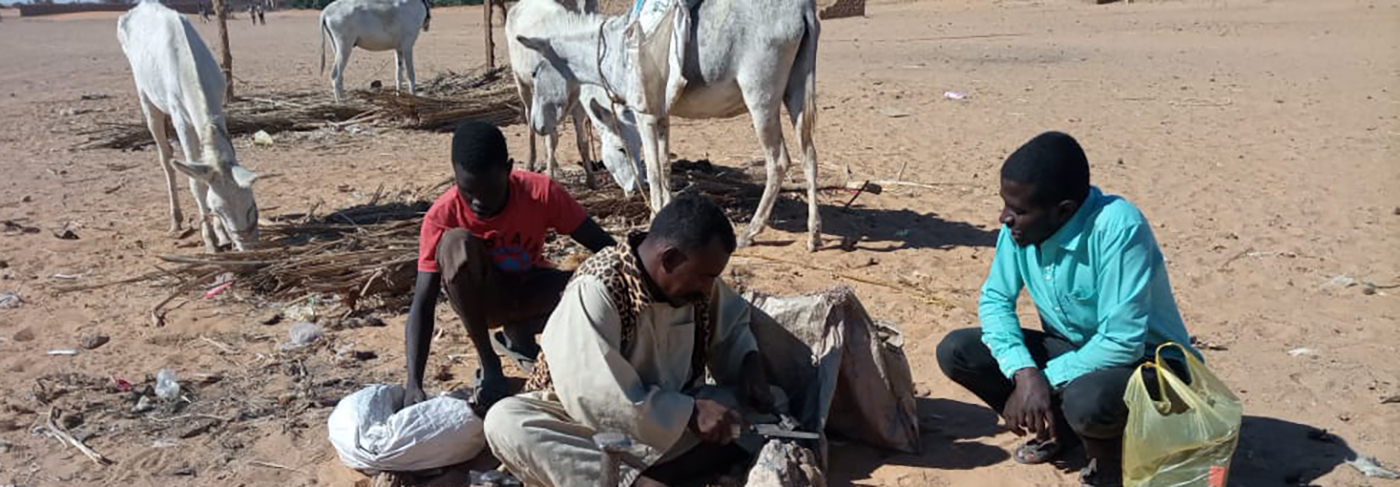After Dr. Nada Fadul used Project ECHO to help her native country of Sudan face down the COVID-19 pandemic, she knew that ECHO’s virtual telementoring model worked. With misinformation running rampant, the ECHO Model was uniquely suited to educate health care workers and vaccinate vulnerable communities, and Dr. Fadul had the evidence.
The Community Medical Response Team COVID-19 ECHO she helped to create held vaccination clinics all over the country–in cities, rural communities and even for nomadic tribes– vaccinating more than 20,000 people. Made up of health profession student and worker volunteers, the team changed the way health care is delivered in a conflict-ridden country where resources are scarce—all by meeting people where they live and work.
But what if the ECHO Model could be used to do even more?
At Project ECHO, that question is being answered every day. Built to solve social inequities, the ECHO Model addresses the profound disparities of access to care and information around the world. By democratizing the implementation of best practices with case-based learning, guided practice, and an “all teach, all learn” methodology, ECHO creates robust communities of practice. And it empowers frontline workers to find solutions.
Aligning with the United Nations Sustainable Development Goals
As the ECHO movement continues to grow around the world, the United Nations Sustainable Development Goals (UNSDGs) provide a clear roadmap for ECHO and for programs like Dr. Fadul’s. Transcending health care, ECHO is a powerful tool to help solve other global problems—and it’s already being used by experts in climate change, education, and other fields.
Aiming High: UN Sustainable Development Goals
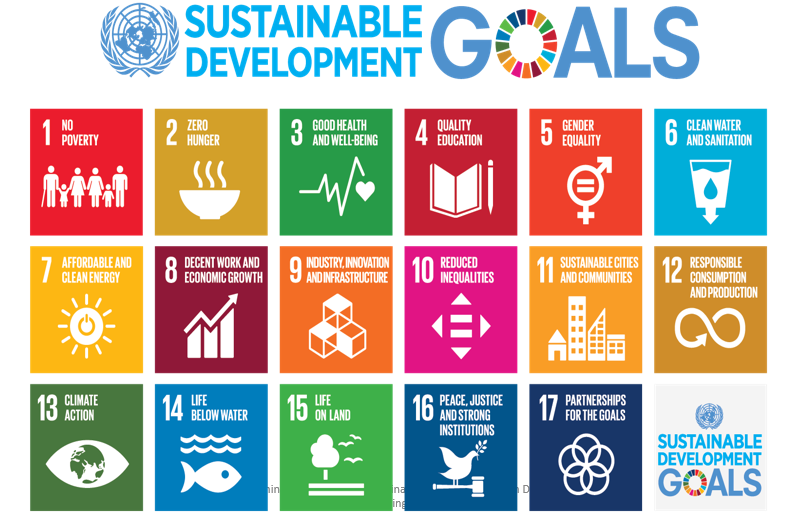
The 17 goals the United Nations have created for Sustainable Development.
When all United Nations Member States adopted The 2030 Agenda for Sustainable Development in 2015, they agreed to a shared blueprint for peace and prosperity for people and the planet, now and into the future.
The 17 UNSDGs that make up this agenda recognize that ending poverty will require strategies that improve health and education, reduce inequality, and spur economic growth – all while tackling climate change and preserving our planet.
Using its “all teach, all learn” approach, Project ECHO has been tackling many of these issues since it was founded in 2003—a dozen years before the UNSDGs were established. Providing behind-the-scenes infrastructure to help stakeholders solve tough, intractable problems, the ECHO Model directly aligns with SDG #17: Partnership for the goals. For Dr. Fadul, who has been working with Project ECHO since February 2021, the model seemed tailor-made to address the kind of systemic change that can drive meaningful progress on all the SDGs.
A Purpose-Built Organization
With a vision to sustainably develop healthy, prosperous communities in Sudan, Dr. Nada Fadul and her colleagues founded SuDRO, the Sustainable Development Response Organization. This nonprofit, formed in 2022, has a mission “to strive, through innovative and collaborative efforts, to attain prosperous, equitable and sustainable communities.” And their strategies are all supported by ECHO.
“If we want to build sustainable relationships, we need to go beyond health,” Dr. Fadul says. “We need to address all of the issues that lead to public health, like water, waste, and telecommunications. And we need to provide equity in knowledge.”
SuDRO is working to implement sustainable community projects using the UNSDGs by training youth, women and other community partners on implementing Project ECHO to meet the SDGs.
To do this, SuDRO created the Sudan ECHO Center of Excellence to build collaborative relationships between communities and academic institutions, governmental agencies, non-governmental organizations and the private sector – across health, infrastructure, peacebuilding, community development, and education.
And to ensure their organization is creating lasting change, they are establishing locally and culturally applicable monitoring and evaluation tools to track progress and outcomes.
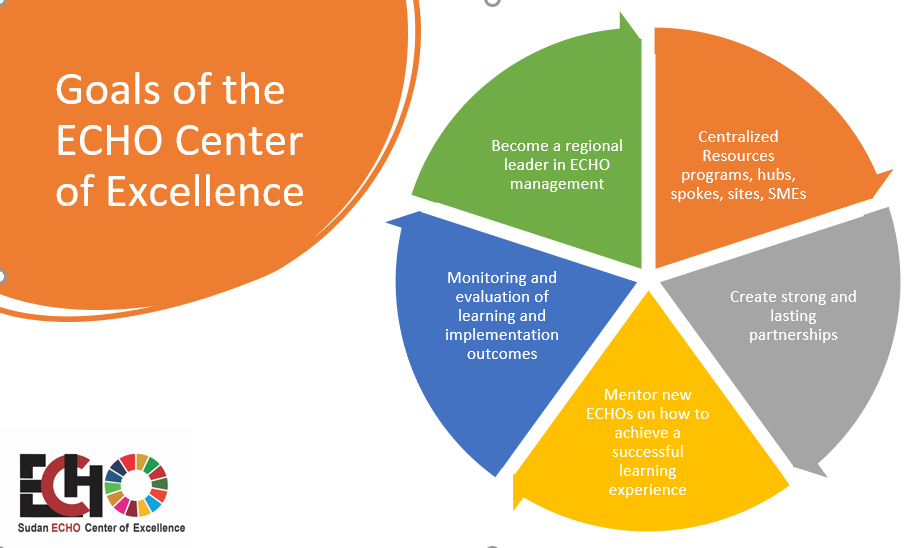
The Goals of the ECHO Center of Excellence.
The Sudan ECHO Center of Excellence will provide technical and administrative ECHO expertise to all hubs, coordinate the shared use of technology-equipped sites in Sudan, and guides the development of ECHO in Sudan.
For Dr. Tagwa Musa, an engineering professor who leads both the Sudan ECHO Center of Excellence and the Community Engineering Response Team ECHO, using ECHO to solve issues beyond health care makes good sense.
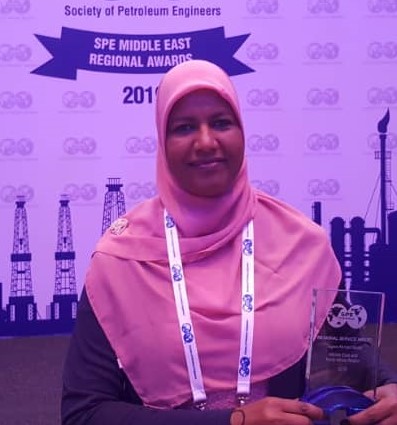
Early Successes
Student volunteers who initially worked on the Community Medical Response Team COVID-19 ECHO are beginning to take the concept and run with it.
“We were so overwhelmed with the COVID-19 situation because we knew that Sudan does not have a resilient health system and it’s absolutely fragile,” says SuDRO volunteer Abrar Alalim. “We knew we had to do something about it, but what to do about it wasn’t clear.”
“Now we’re seeing results,” Alalim says. “We work in an agile way; it’s so easy to communicate and to see your work going forward. We’re motivated and we’re ready to go.”
When SuDRO’s team of volunteers went to a displaced people’s camp in the state of Al Jazirah to help with waste management, they immediately identified even bigger issues, including the lack of clean water. Now, their plan is to address not just health issues in the camp, but also education and water access. Just as important, team members are identifying community members to train, so their work can — Nada Fadul, MDcontinue after they leave the camp.
In Sudan’s Blue Nile state, tribal conflict led to a massacre, which led to a serious medical crisis. The SuDRO team’s initial plan was to provide first aid, but during the week they were there they worked to fill an even bigger need by staffing local clinics. Based on their experience, the team is now planning a disaster response team/emergency task force, working with Sudan’s Ministry of Health.
Lana Ismail, a student leader who is now coordinating a Leadership and Peacebuilding ECHO in Sudan in collaboration with the US-based NGO Conscious Coalition, began working with ECHO during the pandemic as part of the mobile vaccine clinic project.
“We have a huge umbrella now to tackle the UNSDGs with different approaches and different teams according to their specialty.” Ismail says. “This lets us align all resources and manpower to achieve results for the communities we serve.”
The Promise of a New Generation
For Dr. Nada Fadul, the combination of Project ECHO and a motivated younger generation has the potential to transform Sudan.
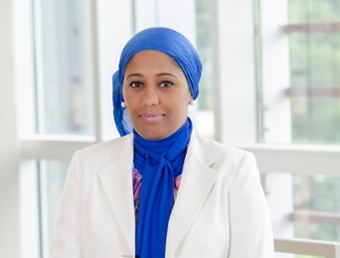
Fadul feels hopeful that her native country, deeply wounded after 30 years of political turmoil, tribal conflict, division and racism, can move beyond these obstacles.
“This generation has the will to transcend this conflict with a vision of One Sudan,” she says. “My hope is that the work will mend the wounds. Bringing students from all areas together created a bond and gave them expertise, tools for conflict resolution and leadership development.”
With new programs like the Leadership and Peacebuilding ECHO, the ECHO Center of Excellence is preparing these students to make a meaningful difference in their country.
Beyond Sudan: ECHO Accelerates UNSDG Progress
Project ECHO is not simply solving problems. Using the model developed by Dr. Arora, Project ECHO has become a behind-the scenes-enabler, amplifier, catalyst, and engine for social good.
“By giving agency to other organizations, the ECHO Model enables experts to do what otherwise might seem impossible,” Dr. Arora says. “With a powerful tool for scaling, amplifying, and sharing their knowledge, experts can multiply their reach and improve lives in the most vulnerable and under-resourced communities on the planet.”
As governments, non-profits and NGOs around the world work to meet the UNSDGs, Project ECHO provides a clear path to do so faster, more effectively, and in ways that address the unique cultures of every community. Already embedded with several international and global organizations to amplify their efforts, ECHO stands ready to partner with and support other groups working to create a more equitable world.
Discover how Project ECHO is helping a new generation of Sudanese leaders drive sustainable development and social equity.
Featured image description: Three community members in Sudan talking with livestock animals behind them. Through initiatives like SuDRO and the Sudan ECHO Center of Excellence, conversations like these help identify urgent needs—from health care to clean water—driving sustainable, community-led development.

